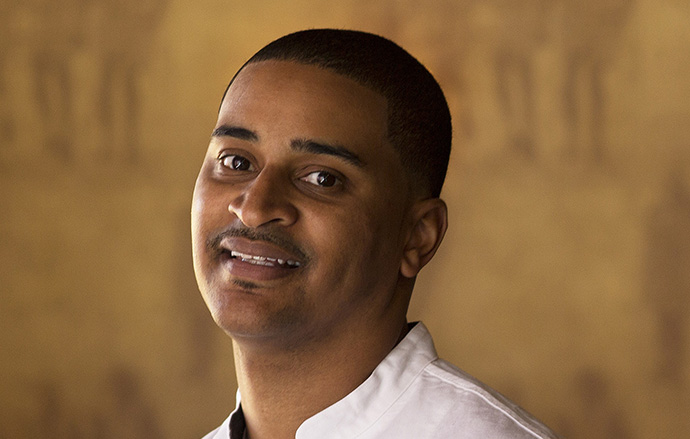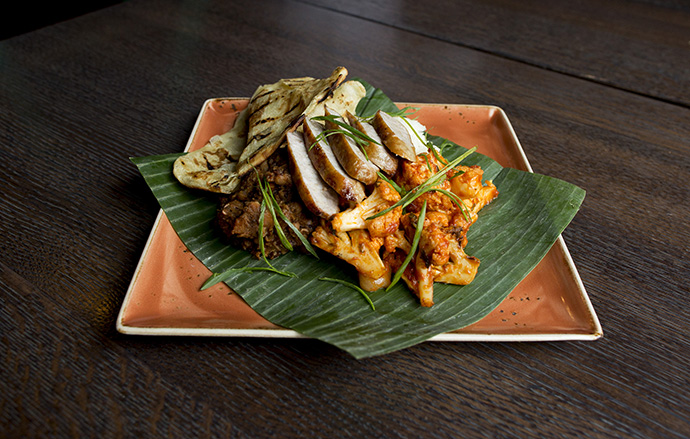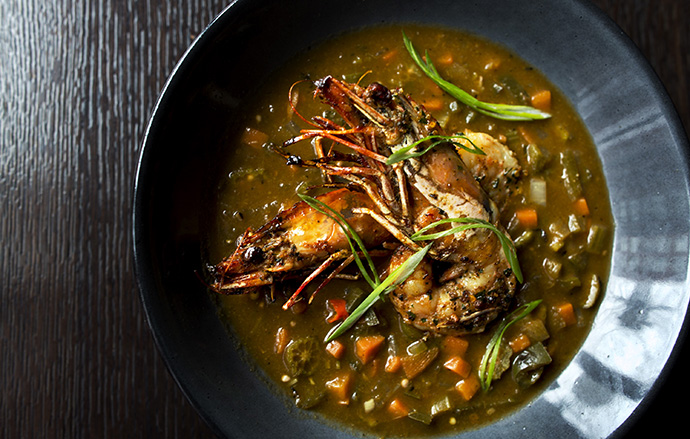JBF Chefs Boot Camp Alum JJ Johnson’s Constantly Evolving Global Cuisine
Maggie Borden
Maggie BordenMay 19, 2016

2015 JBF Award semifinalist JJ Johnson delights diners at the Cecil, a Harlem hot spot with Afro-Asian-American fare that challenges guests to explore more of the world’s flavor profiles. The JBF Chefs Boot Camp for Policy and Change alum recently gave his menu a total makeover, integrating lessons from his recent stints cooking in Israel and at the JBF Award–winning Blackberry Farm in Tennessee. We chatted with Johnson about his historical and contemporary inspirations, his views on the future of culinary school, and how community fits into his vision of the Cecil’s identity.
--
JBF: You spoke at TEDx about how slavery changed the culinary landscape in the 18th and 19th centuries—how has that perspective informed your view of American food?
JJ Johnson: My perspective of American food is influenced by so much. As a bit of background about the cuisine we're cooking: the forced slave migration from Africa helped to create the agricultural (and, ultimately, the industrial) revolution in the New World—particularly through farming and the seeding of cotton fields in the South. The dominant work force, slaves, toiled in the fields, helping create product for the new marketplaces that made this country great and rich. Slaves were the caretakers and innovators of the American table—they were the true beginning of farm-to-table expression.
Post-slavery pioneers like Virginia chef Edna Lewis, South Carolina farmer Dori Sanders, and notable historian Jessica Harris help tell the history of African people and their global influence on American and world cuisines. Alexander Smalls, who is my mentor and culinary collaborator, has been studying the foodways of the African diaspora for more than two decades and that study has informed the restaurants he has opened, most recently the Cecil. Today he continues to tell the history and evolution of Africa's influence—particularly in American cooking. A number of incredible African-American cooks and chefs have helped to make American food what it is today. I incorporate the influence of the West African slaves on regional cooking in the food I cook every day at the Cecil: all of this impacts my cooking because it is the foundation on which I stand.
JBF: Do you think the food at the Cecil is reflective of the local community?
JJ: Right around the corner from the Cecil is Little Senegal, a strip of blocks around 116th Street that’s packed with West African shops and markets. Having these markets so close to the restaurant allows us to get really authentic regional ingredients including fonio, tamarind, and cassava rice. I would definitely say that the Cecil reflects and fits into our neighborhood and community. Alexander Smalls lives in Harlem. I live in Harlem. Almost all of our staff lives in Harlem! We just breathe Harlem and the diverse community we inhabit.

JBF: Can you talk about your experience cooking in Jerusalem? Did you find any overlap with your previous travels to Africa?
JJ: To say that cooking in Jerusalem was an incredible experience would be an understatement! By experiencing traditional Israeli, Palestinian, and Armenian restaurants and markets, I was really able to see the North and West African influence in the city’s cuisine. Of course, Jerusalem is such a melting pot, and to see it from a culinary perspective was so insightful for me. The city embodies so many cultures due to all the people that migrated there. Cooking side-by-side with the chefs there, and the chefs in Ghana a few years before, provided a real immersion into their techniques and flavor profiles. Visiting all of the spice markets and seeing the influences from all over Africa, Asia, and the Middle East in both of these cuisines inspired me so much in terms of what I wanted to do and be as a chef. All culinary schools give you a basic foundation in cooking, whether it is Italian, French, or even Asian. But actually traveling to places like Ghana and Jerusalem introduced me to an entirely new conversation, one that not so many chefs are exposed to, and I am so grateful for those experiences and look forward to more in the future to continue expanding the my personal cuisine.
JBF: You’ve also recently taken a trip to Blackberry Farm in Tennessee, which is known for its role in reviving interest in Appalachian cooking. How did that fit into your own Afro-Asian-American style?
JJ: It was such an incredible honor to cook at Blackberry Farm and to meet so many people there, including the late Sam Beall, whose loss we are all still mourning. What he and his family set out to do—re-introducing Appalachian cooking, which is really the food of the Native Americans—is incredible. Many centuries ago, Native Americans had to learn how to sustain themselves by what was available to them in the surrounding fields, forests, and streams. It's all about sustainability, whether it was through hunting, foraging, or fishing for their next meal.
In a way, I had similar experiences at Blackberry Farm and in Ghana, because in both places, people don’t rely on imported food. Instead, they find the food themselves. I think Blackberry Farm does such an amazing job teaching Appalachian cooking and has inspired so many people across the world, including myself, in the way that we are sharing and teaching Afro-Asian-American cooking at the Cecil.

JBF: Another major change to your menu has been the incorporation of heirloom grains like African popping sorghum from Anson Mills. What inspired you to start sourcing from them?
JJ: I finally had the opportunity to meet Glenn Roberts from Anson Mills while cooking at Blackberry Farm with the Southern Foodways Alliance. Glenn and I really hit it off, and he seemed to instantly understand my style of cooking and the history behind it. All of the grains that he produces have such a rich historical background similar to the cuisine of the African diaspora. I appreciate people like Glenn who continue to cultivate these grains, including Chinese brown and black rice, Carolina gold rice, and West African sorghum, that are no longer being used. After speaking with him, I knew I had to incorporate these native heirloom grains into my menu—grains that haven't been eaten in the U.S. in centuries!
JBF: The Cecil is part of a new generation of restaurants that are changing diners’ expectations about fine dining and American cooking. What is your personal definition of American cuisine? Do you think culinary schools will integrate this shift in focus from Euro-centric to reflecting a more curious and global public palate?
JJ: American cooking is a melting pot—it's based off of regional cuisine, whether it is Northeastern, Southern, Tex-Mex, or Californian. It's impossible to define it in one way. My view is that if the top culinary schools want to keep being the best, they will have no choice but to add a more global perspective to their culinary programs—and I sincerely hope they will. It can't simply be Euro-centric anymore. At some point, they will have no choice but to acknowledge these changes because this generation is being introduced to more and more diversity when it comes to food.
I appreciate chefs like Michael Solomonov from Zahav who really introduced Israeli cooking to the US. These are the people who are making an impact in the culinary world. Back in the day, no one would have thought that Italian cooking would be part of the fine-dining landscape. Now, it’s the same with Israeli cooking, along with the food of the African diaspora. Each cuisine needs leaders to re-introduce it to the culinary landscape, and it can also be part of the conversation for young chefs looking for inspiration during their culinary training.
JBF: What was your biggest take away from the JBF Chefs Boot Camp for policy and change?
JJ: My biggest takeaway from JBF's boot camp is how we, as chefs, can be impactful in changing and bettering school lunch programs in the U.S. Learning about how and where your food comes from should be part of the academic curriculum. It’s all about educating kids at a young age. Since attending boot camp, I have been looking at the food industry in a new light. Soon I will soon be visiting the Edible Schoolyard NYC project in Harlem to meet with and cook with the kids as part of their guest-chef program, and it's just one of many organizations that we work with locally and throughout the city.
Learn more about our Chefs Boot Camp for Policy and Change.
--
Maggie Borden is associate editor at the James Beard Foundation. Find her on Twitter and Instagram.




-57 web.jpg)


